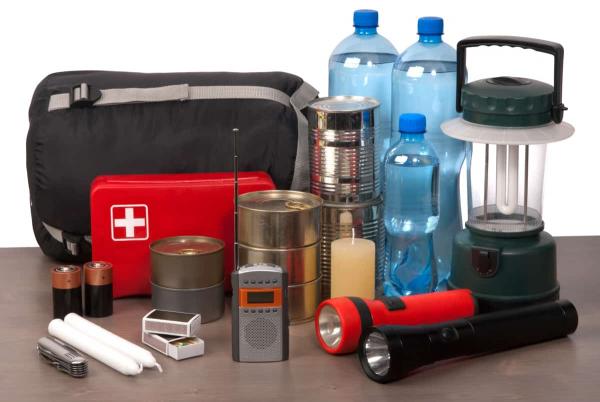
Emergencies and disasters come in many forms - some are very serious and others are more minor. Children and parents can become anxious or worried when contemplating the various possibilities, but with planning your family can be prepared, not scared, when facing emergencies or natural disasters.
Emergencies come in different forms. Recently, throughout the world, there have been many natural disasters as well as other major concerns. Car accidents, house fires, tornadoes, earthquakes, power-outages and other conditions can potentially harm your family if you are not adequately prepared for such events. It's near impossible to foresee the needs of every situation, but by planning to handle such events, you will be more ready when disaster strikes.
Have an emergency plan.
Planning and practicing evacuation routes and procedures is one way to help your family stay safe. Have fire drills and help children to know how to escape through windows or other alternate routes in your home. Teach what to do in an earthquake to avoid falling structures or objects. Pre-set a meeting place or have several ways to get ahold of each other if you become separated during a disaster. Keep emergency phone numbers posted, and discuss types of emergencies that require a call to 911 versus calls to relatives or friends for help. Have drills, and practice safety routines every few months or what you feel is necessary for your family. By practicing procedures to follow during an emergency, your family will be able to know what to do without hesitation.
Create a first-aid kit and keep it accessible and replenished.
Antibiotic ointment, various sizes of adhesive bandages, ibuprofen or acetaminophen and sterilizing cleansers are just a few items you may consider keeping in your kit. Make your kit to match your family's needs. If you have a child with severe allergies or family members that need medications, you will need to plan for that. As you use items from your kit, be sure to replace them so you'll have them when needed.
Put together 72-hour kits for each family member.
Most 72-hour kits are designed to facilitate survival for three days. Need for these kits could be during a natural disaster, if you become stranded far from help or during other emergencies. Food, water, a change of clothes, a flashlight, whistle, first-aid kit, soap, matches and protective gear from rain, heat or cold are some main items you'll need to consider. Each family member should have their own supplies in a backpack or other easily carried container. Having these prepped and ready to go will offer some peace of mind amid stressful scenarios.
Store food and water when possible.
Having at least a three month to one year supply of food is a great way to stay prepared. We've all seen movies where disaster strikes and the grocery stores turn into pandemonium - people frantically grabbing food and water from shelves, sometimes meeting a lethal end out of desperation. Avoiding those situations, being self-reliant and perhaps even being ready to help a neighbor are important regardless of the situation. You may need to rely on this supply during times of job loss or underemployment. Store food that you eat regularly and consider foods that you can prepare without electricity. Rotate by using stored food and replace it with new. Keep water in large storage containers. Water is important for hydration as well as sanitary needs.
Find and practice alternative ways to cook.
Having a grill or Camp Chef stove can aid in feeding your family without power. Cooking by using fire or hot coals is another way. Keep chopped wood, coals, propane and other items stored to facilitate cooking. A Dutch oven, aluminum foil or other items to cook in are necessary as well.
Plan to stay warm or keep cool.
Without power or while displaced from your home, you will need to plan for the climate you may experience. If it's winter, you'll need to have jackets, gloves and a way to make heat such as a campfire or generators to make power to heat your home. If it's hot out, you'll need hats to block the sun, sunglasses and sunblock to avoid sunburns. Also, consider using umbrellas for shade or staying near trees to cool off. Water becomes crucial in these times, as well.
Other important miscellaneous items.
-
Keep a supply of cash on hand since there is a good chance that ATMs or other electronic means will not work.
-
Try to keep your gas tank near full to avoid waiting in long lines during an evacuation, thus wasting valuable time.
-
Write down emergency phone numbers or those of loved ones you'll need to contact. Cell phones or other electronic devices have a short battery life if there is no power so you can't rely on them.
Emergency preparedness websites:
Ready.gov
Emergency Preparedness and Response|CDC
Emergency Preparedness and Response
Emergency Preparedness BSA
Prepare For Emergencies | Be Red Cross Ready | Red Cross
http://familypreparation.blogspot.com/With emergencies and disasters, it's not likely an "if," but "when" it will happen. Don't panic. When you are prepared, you can reduce the fear, panic, stress and confusion of the situation. Prepare what you can today, and work on the rest day by day.

